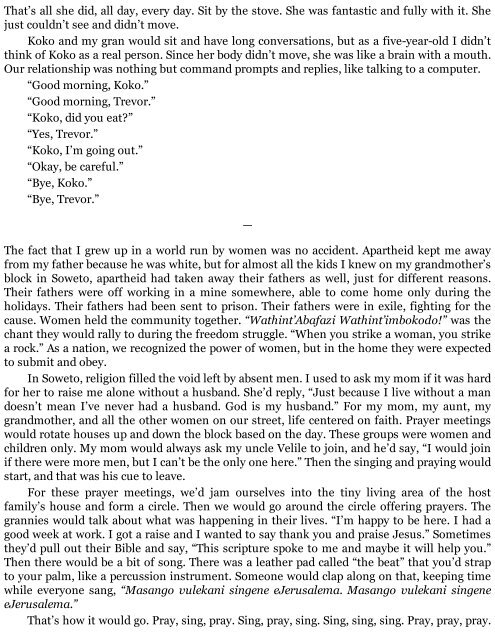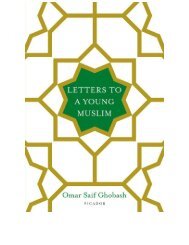You also want an ePaper? Increase the reach of your titles
YUMPU automatically turns print PDFs into web optimized ePapers that Google loves.
That’s all she did, all day, every day. Sit by the stove. She was fantastic and fully with it. She<br />
just couldn’t see and didn’t move.<br />
Koko and my gran would sit and have long conversations, but as a five-year-old I didn’t<br />
think of Koko as a real person. Since her body didn’t move, she was like a brain with a mouth.<br />
Our relationship was nothing but command prompts and replies, like talking to a computer.<br />
“Good morning, Koko.”<br />
“Good morning, Trevor.”<br />
“Koko, did you eat?”<br />
“Yes, Trevor.”<br />
“Koko, I’m going out.”<br />
“Okay, be careful.”<br />
“Bye, Koko.”<br />
“Bye, Trevor.”<br />
—<br />
The fact that I grew up in a world run by women was no accident. Apartheid kept me away<br />
from my father because he was white, but for almost all the kids I knew on my grandmother’s<br />
block in Soweto, apartheid had taken away their fathers as well, just for different reasons.<br />
Their fathers were off working in a mine somewhere, able to come home only during the<br />
holidays. Their fathers had been sent to prison. Their fathers were in exile, fighting for the<br />
cause. Women held the community together. “Wathint’Abafazi Wathint’imbokodo!” was the<br />
chant they would rally to during the freedom struggle. “When you strike a woman, you strike<br />
a rock.” As a nation, we recognized the power of women, but in the home they were expected<br />
to submit and obey.<br />
In Soweto, religion filled the void left by absent men. I used to ask my mom if it was hard<br />
for her to raise me alone without a husband. She’d reply, “Just because I live without a man<br />
doesn’t mean I’ve never had a husband. God is my husband.” For my mom, my aunt, my<br />
grandmother, and all the other women on our street, life centered on faith. Prayer meetings<br />
would rotate houses up and down the block based on the day. These groups were women and<br />
children only. My mom would always ask my uncle Velile to join, and he’d say, “I would join<br />
if there were more men, but I can’t be the only one here.” Then the singing and praying would<br />
start, and that was his cue to leave.<br />
For these prayer meetings, we’d jam ourselves into the tiny living area of the host<br />
family’s house and form a circle. Then we would go around the circle offering prayers. The<br />
grannies would talk about what was happening in their lives. “I’m happy to be here. I had a<br />
good week at work. I got a raise and I wanted to say thank you and praise Jesus.” Sometimes<br />
they’d pull out their Bible and say, “This scripture spoke to me and maybe it will help you.”<br />
Then there would be a bit of song. There was a leather pad called “the beat” that you’d strap<br />
to your palm, like a percussion instrument. Someone would clap along on that, keeping time<br />
while everyone sang, “Masango vulekani singene eJerusalema. Masango vulekani singene<br />
eJerusalema.”<br />
That’s how it would go. Pray, sing, pray. Sing, pray, sing. Sing, sing, sing. Pray, pray, pray.
















